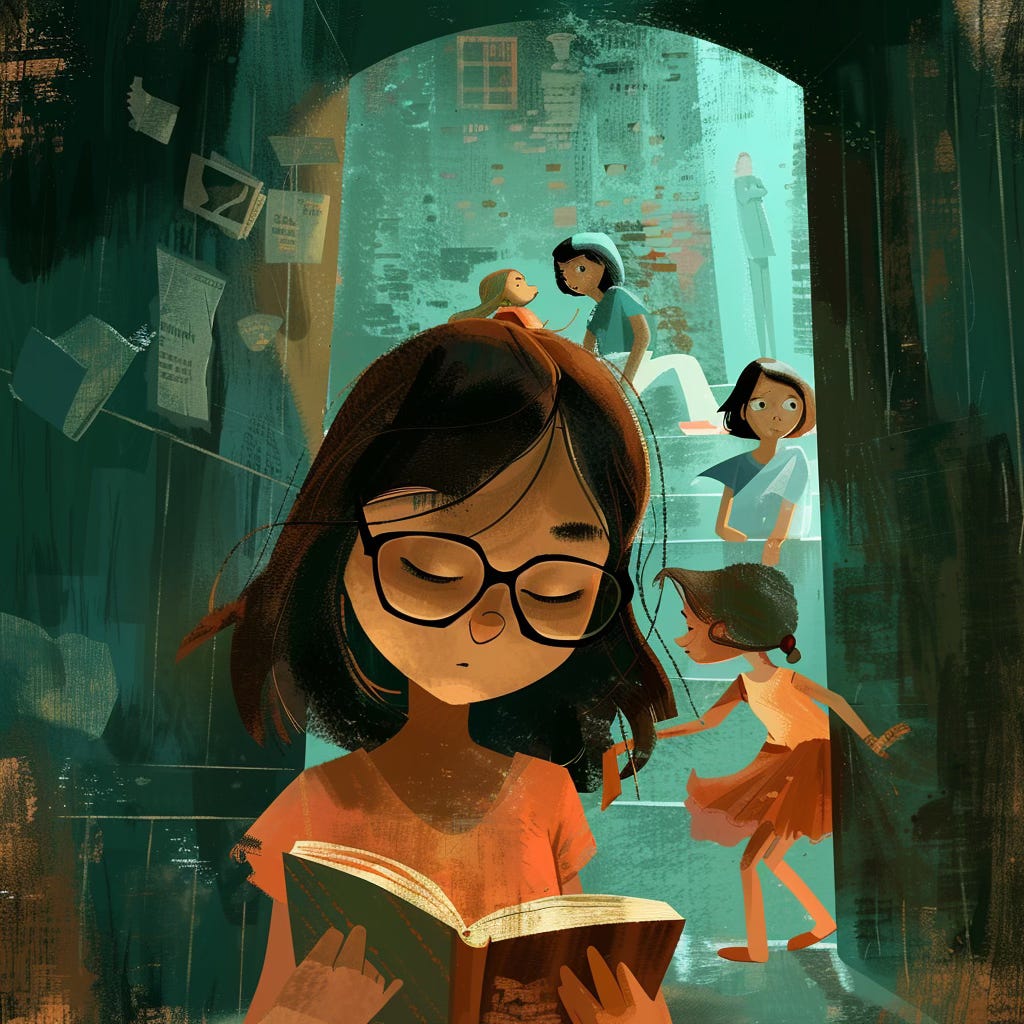Why I'd Rather Identify as a 'Nerd' than an 'Expert'
The word 'nerd' is very present on this Substack and it's one I often use to introduce myself. Some believe this word is self-diminishing - suggesting you're somewhat 'uncool'. Here's why I disagree.
I didn’t expect to write this post today, but I’ve been spurred by an intriguing LinkedIn post that challenged the use of the word ‘nerd’ to describe those of us consumed by curiosity and passion for a particular topic. Here’s how Alice Egan nudges us to re-think nerdiness:
I'm tired of people calling themselves "nerds" when they talk about something that they are really interested in, intrigued by, or curious about.
Why is unabashed curiosity "nerdy"?
And yes, I know, there's nothing wrong with being a nerd and nerd culture. But despite nerds reclaiming the word nerd, it still has an undercurrent of "it's uncool for me to be so into this."
Why can't we just fully own what interests us?
Am I a nit-picky linguist or am I inspiring you to stop using this word?
Alice, I love your nit-picky linguist challenge - which I find, in and of itself, delightfully nerdy! :) Here’s my take on it.
Growing up, I have often been called ‘nerdy’ not as a compliment, but as a reminder that I didn’t fit in. My passionate interests, my readings, my opinions and my eagerness to participate in class (especially when everybody wanted to go on break and I was so caught up in my curiosity that I obliviously threw in that dreaded ‘last question right before the bell rang’) - made me much less popular among kids my age than among the adults I interacted with.
Over the years, I learnt to find my ‘tribe’ and bonded with fellow ‘nerds’ who also read for pleasure, loved to ‘go deep’ into topics they were curious about, were keen to exchange musings, ideas, experiment and daydream together.
As a high-schooler, my nerdiness became like a magical compass pulling me in the direction of my passions and paving the way for future professional choices. My interest in understanding how humans think, feel, interact and grow started to supersede any other interest.
I got so involved in a philosophical debate club one of my teachers - a fellow ‘nerd’ - had initiated and which had then taken on a life of its own - that I forgot to come home until way too late one night and got in big trouble. I could not for the life of me convince my parents (who otherwise were strongly encouraging of my intellectual pursuits) that I had gotten absorbed in a conversation about Sartre’s existentialism and the meaning of life. After all, what adult believes that’s the real reason why a 16-year-old would spend too much time hanging out in a public park after dark with other 16—year—olds? That was sadly the end of my participation in the philosophy club - such unbridled passion was deemed ‘impractical’ and even ‘risky’.
It was around that time I noticed the adults around me, who had always supported my passion for learning, starting to get worried that my ‘nerdiness’ was not of the right sort. See, I believe my parents had hoped I’d be more of a math or computer geek and deemed geekiness as a quality as long as it was in the exact sciences, which they believed would lead to a well-paid career. By contrast - philosophy and psychology were considered highly impractical pursuits (mind you, this was Eastern Europe over 25 years ago, when the world was a very different place). I was often told:
“There’s no way you’ll make a living out of psychology!”
So I ended up studying political science as a sort of compromise (at least it had ‘science’ in the title!). I hated it and for a good few years, my nerdiness was all but extinguished. I was too preoccupied with stretching my brain in ways that brought me no pleasure but did result in passing exams and completing a degree at the end of which I felt absolutely nothing. I distinctly remember during those years my curiosity and drive for learning were at their lowest point of all time. And then something happened.
In the last year of Uni, I lost a person I deeply loved to mental illness. The shock and incredible pain of that loss and the need to understand what had happened threw me back into my pursuit of psychology and, paradoxically, gifted me back my passion and love of learning about the human condition. As synchronicity had it, at about that same time I also landed a job in training and development - and there was a place where my interest in how humans learn, grow and thrive found an outlet.
Looking back, it was ‘the Nerd’ who saved me because it prompted me to work my way through pain by learning - an impulse way more constructive than many other self-destructive patterns that could have played out (and did play out for a while) in my life. In the end, I turned out to be so obsessively curious about the human mind that even my own suffering became an object of inquiry.
It was my nerdiness that set me on a profound journey of self-exploration - which took me first through therapy, and then towards further study. I ended up doing a Master's in Positive Psychology (which I loved and which gave me back the joy of formal learning!) because I wanted to understand why ‘thriving’ seems to be more than simply the opposite of ‘suffering’. Later, I felt driven to explore how life-long growth unfolds and what it takes to cultivate wisdom, and that brought me to the research on vertical development, my PhD (which, because it was 100% passion-driven, was the most fulfilling academic experience of my life) and finally to my current work. From that initial need to heal and make meaning of a profound disorienting dilemma, I ended up building a career driven by my nerdiness.
In the process, I seemed to accidentally become something other people sometimes describe as ‘an expert’ in my field. I have never identified with that word and here’s why. This is how Oxford dictionary defines “nerd”:
NERD:
noun
1.
a person who is extremely enthusiastic and knowledgeable about a particular subject, especially one of specialist or niche interest: e.g. "the executive is an unabashed film nerd"
verb
engage in or discuss a technical field obsessively or with great attention to detail: e.g. "his engineering background means he tends to nerd out a bit on the numbers"
And here’s how it defines “expert”:
EXPERT:
noun
a person who is very knowledgeable about or skilful in a particular area: e.g. "an expert in healthcare"
adjective
having or involving a great deal of knowledge or skill in a particular area: e.g. "he had received expert academic advice"
Notice a difference?
To me, there’s a very big one that makes me choose ‘nerd’ over ‘expert’ any day: enthusiasm and passion. I think you can be both an expert and a nerd when you truly love the topic you’re deeply knowledgeable about and you preserve your relentless curiosity and sense of wonder. I also believe you can be an expert without ever having been a nerd or, more often than not, you might end up losing your ‘nerdiness’ in the pursuit of expertise. That’s when the end goal of ‘knowing’ supersedes the intrinsic motivation to continue exploring. It’s when your passion gets sucked out of you on the road to becoming ‘the best’ at something you once loved. It’s when you end up making a chore of your topic of expertise; when you’ve lost the joy or when you’ve lost yourself to the point of believing there’s nothing more to learn.
As a mother of a bookish little girl, openly identifying as a Nerd has helped normalise passion and curiosity in our family and helped my daughter embrace her nerdy drive in a much healthier way (and much sooner in her life) than I was able to. She too is different from many kids her age, but that doesn’t prevent her from making friends because she’s learnt very early to both embrace her own passions and stay curious about other people’s - seeking the unique gifts they hold. Being at peace with her nerdiness gives her the confidence to be both kinder to herself and more compassionate with others.
So coming back to Alice’s question - “But despite nerds reclaiming the word nerd, it still has an undercurrent of "it's uncool for me to be so into this." Why can't we just fully own what interests us?” - I’d say that identifying as a ‘nerd’ might in fact be a great way of fully owning what interests us. The word itself suggests we’re not only interested but also curious and keen to learn more. It invites a deeper conversation. It signals we’d rather explore something of significance than stay in the ‘chit-chat’ realm (as an introvert, I dread chit-chat, but count me in for a profound chat any time!). It connects us to other curious, passionate minds who have not lost their childhood-like wonder. It also gives us permission to be a bit playful, try out new things, and build on others’ ideas rather than talk at each other.
I’d rather be invited to join a panel of ‘nerds’ than a panel of ‘experts’. I’d take it as an invitation to ask questions rather than just state opinions, to focus on what I don’t know and what I might learn, rather than strive to prove what I do know and why my point is ‘right’. I’d take it as a nudge to engage with fellow nerds, to stimulate each other’s thinking, to improvise in the moment. What would you rather be part of - a ‘scholarly debate’ or a ‘nerd-out’? I’ll take the latter any day.
Dive deeper
I hope you’ve enjoyed this article. If you are curious to dive more deeply into learning about Vertical Development and how it might impact your work and life, check out our online library of webinars and certification programs accredited by the International Coaching Federation.
If you are seeking to train as a developmental coach and get your first ICF credential, admissions are now open for the next group of our ICF Level 1 Foundation Diploma in Developmental Coaching starting in July, with the early bird offer (-500$) ending on the 30th of May. Check out the Program Page for details and reach out for an interview.
Spread the word…
If you want to bring your bit to building a wiser, more conscious world, I hope you share this article with others who could benefit from the learning.
and, if you haven’t done it yet, Subscribe!
Join your nerdy community and let’s keep on staying curious and learning from each other.






As a "word nerd", I really appreciate that you went to the dictionary definition of "nerd". I agree that an enthusiasm for a niche topic is definitely something we should embrace and encourage. Bring on the nerdiness!!!
Love this Alis! Always cringed at any applied expert moniker - Experts usualy seem to have undeniable evidence of expertise...while Nerds only seem to know that what exists is debatable and what you can possibly know about it constantly evolves - Go Team Nerd!